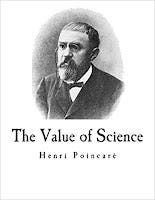Many great scientists and philosophers have articulated the ideals of science across numerous volumes. They explored the ultimate goals of science and the means to achieve them.
Henri Poincaré, the great savant, began his essay “The Value of Science”
with this profound statement:
“The search for truth should be the goal of our activities; it is the sole end worthy of them.”
The Search for Truth is what Science is about, or what it should be about. More importantly: the search for truth is the only worthy goal of life. Unlike salvation, enlightenment, or happiness in some philosophies and religions, truth is life’s most worthy goal. Moreover, the truth that Science seeks is not some “personal truth”. Scientific Truth has a value only when it is shared. Sharing fosters objectivity. It also enables us to serve others.
Science Should Be About Helping Humanity
What about alleviating human suffering? - Poincaré’s answer is immediate:
Doubtless we should first bend our efforts to assuage human suffering, but why? Not to suffer is a negative ideal more surely attained by the annihilation of the world.
Poincaré emphasizes that merely eliminating suffering is insufficient; instead, science should aim higher.
If we wish more and more to free man from material cares, it is that he may be able to employ the liberty obtained in the study and contemplation of truth.
This echoes a timeless principle: “And ye shall know the truth, and the truth shall make you free.” (John 8:32).
Certainly, Poincaré is not inventing something new here. He is reminding us of a very old but often forgotten fundamental principle. It is all too easy to forget it – and Poincaré realizes this difficulty as well:
But sometimes truth frightens us. And in fact we know that it is sometimes deceptive, that it is a phantom never showing itself for a moment except to ceaselessly flee, that it must be pursued further and ever further without ever being attained.
Moreover:
We also know how cruel the truth often is, and we wonder whether illusion is not more consoling, yea, even more bracing, for illusion it is which gives confidence. When it shall have vanished, will hope remain and shall we have the courage to achieve? Thus would not the horse harnessed to his treadmill refuse to go, were his eyes not bandaged?
Can You Handle the Truth?
... the act lacked any useful purpose.
Indeed, truth can be cruel, and, sometimes, unnecessarily so. I learned this lesson during a talk by a mathematician friend. I had my camera with me and, when the speaker was yelling at one of his colleagues who was evidently unhappy with the subject of the talk, I took a photo. Later, I sent it to the unhappy colleague. My friend was upset and asked why I did it.
I answered: “Because it is true.” It took me awhile before I understood and apologized for what I did. I reasoned that while something is true – why not reveal it? Perhaps: but in this case it was simply an unnecessary cruelty from me. What I saw as an innocent joke caused pain, revealing its lack of purpose.
Truth in Science is not a joke, it is a serious matter, and it serves a purpose. That purpose is increasing our Knowledge – about the external world and about ourselves so that we can help others, not hurt them.
Barriers to Scientific Progress
There were, in the past, and even more so today, strong forces that prevent Science from achieving its goals. What are they? Some of them were indicated by Poincaré when he wrote:
And then to seek truth it is necessary to be independent, wholly independent.
It is not easy for a scientist to be independent and, in fact, with time, it has become more and more difficult. The time is long gone when amateurs, with independent wealth could conduct history-making experiments and develop revolutionary ideas that were opening new paths of scientific research.
P.S.1 03-03-23 21:21 Concerning Science and Truth see Chris Langan most recent post Unfortunately to read it in full you would need to subscribe and pay.
"Flirting with Luddism: The Meaning and Value of Science
Science is great. Evil, insanity, and the Big $cience Oligarchy are not.
Chris Langan
Let me quote just one sentence relevant to the subject of my post:
"Science is not about truth. Direct replicated observation is about truth, but due to the problem of induction - a problem that has been understood since David Hume and arguably long before - empirical science quickly deviates from it due to uncertainty. "
P.S.2 04-03-23 15:51 Reading while having fish for lunch. From Manjit Kumar - "Quantum Einstein, Bohr and the Great Debate About the Nature of Reality"
"‘We cannot observe electron orbits inside the atom,’ replied Heisenberg, ‘but the radiation which an atom emits during discharges enables us to deduce the frequencies and corresponding amplitudes of its electrons.’ Warming to his theme, he explained that ‘since a good theory must be based on directly observable magnitudes, I thought it more fitting to restrict myself to these, treating them, as it were, as representatives of the electron orbits’. ‘But you don’t seriously believe,’ Einstein protested, ‘that none but observable magnitudes must go into a physical theory?’ It was a question that struck at the very foundations on which Heisenberg had constructed his new mechanics. ‘Isn’t that precisely what you have done with relativity?’ he countered. A ‘good trick should not be tried twice’, smiled Einstein. ‘Possibly I did use this kind of reasoning,’ he conceded, ‘but it is nonsense all the same.’







I think Langan's statement could be called, "chopping down a tree to grow the forest". Yes, uncertainty of measurement between observers does exist, but that doesn't exclude science being about truth. In this respect I agree with Poincaré. The exchange between Heisenberg and Einstein is interesting as well, and brings the concept of visibility to the question of what constitutes good science. Does Newton's gravitational 'constant' exist even though we cannot observe it directly, but only infer it? Does inference form a sort of 'observation' itself? Is imagination a form of observation, albeit a more uncertain one? It seems to me that acknowledging uncertainty and finding truth are both essential for the scientific method.
That's perfect. That's beautiful:
"Moreover, the truth that Science seeks is not some “personal truth”. Scientific Truth has a value only when it is shared. Sharing fosters objectivity. It also enables us to serve others."
Truly a philosopher. Science was never about a personal truth, it was always about sharing. What would a man do without a woman, and they without a child? There would be no anything. Science objectifying them from themselves, to each other, to one another, expands the beloved truth. Of course, symbolism. One needs some description of where they came from, and using the tools we have here, we find the answers. Many try to fight against the truth when told, at the same time, they could be saying that which the other had said, but in their own way or words, and so, objectivity is an important way to get to know how the others around you complement and complete one another while allowing each other the gift that was given to us, to grow.
Anyway, enough of my poetry. I have had such a difficult day, and yet, when I read excellent expressions such as yours, an intelligent being, it picks me up and helps me back on my way. Appreciated. I wish there were only intelligent beings, but that's personal, not objective, and hence, haha, difficult... when one has to realign with what they forgot, but never forgot to begin with. If all our difficulties are because of not realizing our own true self, then there needs to be a science to hurry up, take your time, to find the answer to everyone's true being, bridge it, grab it, hold it, and observe along in that joyous heart of ours all together. Hahaha.